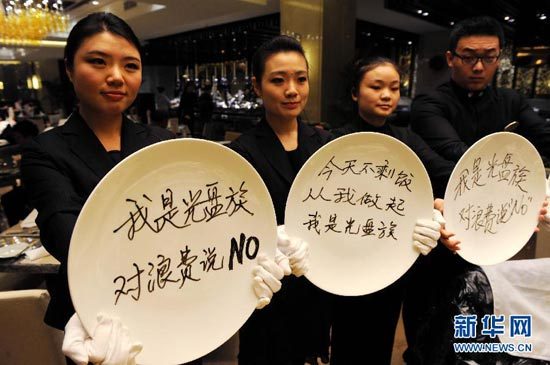With more Chinese heeding a national call, curbing food waste and promoting thrift have increasingly become a common practice among restaurants and diners. It is also apparent during the ongoing eight-day National Day and Mid-Autumn Festival holiday.

Photo/Xinhua
Chinese catering firms have been urged to introduce measures to put an end to food waste while improving the quality of products and providing better service, according to an action plan co-issued by the food safety authority under the State Council.
The plan calls for measures to be integrated into the entire process from material purchase, storage, processing, to serving food and takeaway.
Many companies that took steps keeping in mind the anticipated rise in customer numbers during the holiday -- usually a busy period in China for family gatherings, travel and eating out -- saw efforts proving effective.
In a buffet restaurant along Qingnian Road of Chaoyang District in Beijing, the Chinese capital, ready-to-eat seafood is now shelved in smaller dishes. Eaters who finish all they have fetched will receive a fruit as a gift before leaving the restaurant, according to the manager, Zhang Weidong.
Wang Yajing, deputy manager of the Beijing Hepingmen branch of Quanjude, one of China's best known roast duck chain restaurants, said the branch has recently seen a 40 percent decrease in leftovers because of efforts to curb food waste, which also made garbage storage and sorting easier.
The food chain has trained staff to help customers order the right amount of food. It also provides free packaging services so that diners can take away leftovers, and gifts them badges with the words "role models of practicing thrift."
Similar changes are also taking place in Shanghai.
At a recent wedding banquet in the Minhang District of the city, fewer dishes were seen on the tables and many guests took away the leftovers.
Xu Jie, the groom, said the quantity of dishes was decided taking into account the number of guests. Boxes and bags were provided to guests to take away the leftovers.
In the past, local people enjoyed wedding feasts with excess food and huge plates, in a show of pomp that often led to a huge amount of food being wasted, recalled He Haiying, a local resident.
In Shenzhen, south China, six KFC outlets recently unveiled a pilot charity program called "Food Bank," where unsold food is given free to people in need. The food is stored in freezers and put into small bags on which information including product name, storage date, and processing guidelines are mentioned.
At the same time, "Clear Your Plate," a national campaign against wasting food, continues to gain steam online in the country.
Social media users, especially the young, have been invited to share photos or videos of empty plates on Weibo after finishing their food. Weibo is a popular social media platform on which fighting food wastage is among the most viral topics.
Media outlets, government agencies, social organizations and internet celebrities have joined the online stream of messages against wasting food, which has been welcomed by netizens.
"When eating a mouthful of congee or rice, one should bear in mind that its production is not easy," wrote Tong Dawei, a young Chinese actor, quoting a proverb, in a Weibo post with photos of empty food plates.
As of Sunday evening, the "Clear Your Plate" campaign, with the hashtag #GuangPanXingDong, had generated over 1 million posts and 800 million views on the platform.
The China Consumers Association has reminded consumers to be reasonable in ordering meals and do so keeping in mind the number of diners, urging them to avoid eating extravagantly.
In a related development, the Communist Party of China (CPC) Central Commission for Discipline Inspection and the National Supervisory Commission exposed officials in six cases of violating frugality rules in a statement on Sept. 28.
The country's top graft watchdog released the names of seven officials involved in the misuse of public funds for banquets and tours, accepting gifts, and awarding unauthorized allowances or bonuses, among other violations.
It warned officials against inappropriate behavior during the holiday, which usually sees a rise in gifting, banquets, and related activities in China. To reduce undesirable work practices, the CPC had released its eight-point rules on austerity in late 2012.


